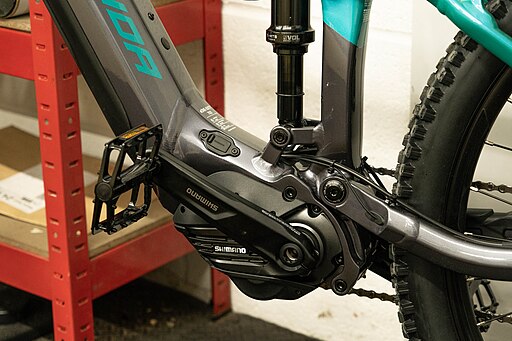Rules and Regulations: Do Electric Bikes Need to Be Registered?
Last Updated on March 27, 2024 by Kristina Grant
In recent years, there has been a noticeable surge in the popularity of electric bikes (e-bikes) as people seek alternative and eco-friendly modes of transportation. These innovative vehicles offer the perfect blend of convenience, efficiency, and sustainability, making them a favored choice for commuters, recreational riders, and eco-conscious individuals alike.
Amidst this growing trend, however, arises a pertinent question: Do electric bikes need to be registered? Understanding the regulations and legalities surrounding electric bikes is crucial for anyone considering ownership or already riding one. While e-bikes offer numerous benefits, navigating the intricate web of laws and requirements can be daunting without proper guidance.
In this blog post, we delve into the complexities of electric bike registration, aiming to provide clarity on this often-misunderstood topic. We’ll explore the various factors that influence whether registration is necessary, outline the registration process step-by-step, and shed light on exemptions, legal implications, and state-specific laws.
By the end of this discussion, readers will gain a comprehensive understanding of electric bike registration requirements, empowering them to make informed decisions and ensuring compliance with relevant regulations. Whether you’re a seasoned e-bike enthusiast or considering your first purchase, buckle up as we embark on this journey through the legal landscape of electric bike ownership.
Key Takeaways
- Electric Bike Registration is Subject to Local Laws and Regulations:
- Electric bike registration requirements are determined by local laws and regulations, which can vary significantly from one jurisdiction to another. Understanding and complying with these regulations are essential for all e-bike owners to ensure legal compliance.
- The Registration Process May Vary Depending on Jurisdiction:
- The process for registering an electric bike can differ based on the jurisdiction. While some areas may have straightforward procedures, others may require additional documentation or steps. Riders should familiarize themselves with the specific requirements in their area to facilitate a smooth registration process.
- Non-Compliance with Registration Laws Can Lead to Legal Consequences:
- Failure to comply with electric bike registration laws can result in legal consequences such as fines, penalties, or citations. Riding an unregistered e-bike may also void insurance coverage and expose riders to civil liabilities in the event of accidents or collisions.
- Some Jurisdictions Offer Exemptions from Registration Requirements:
- Certain jurisdictions may provide exemptions or exceptions to electric bike registration requirements based on specific criteria. These exemptions may apply to certain types of e-bikes or usage scenarios, but eligibility varies by location. Riders should verify exemptions based on local laws.
- It’s Essential to Research and Understand Electric Bike Laws in Your Area:
- To ensure compliance with electric bike laws and regulations, riders should research and understand the applicable laws in their area. This includes familiarizing themselves with registration requirements, exemptions, speed limits, and permissible riding locations.
- Following the Registration Process Correctly Ensures Legal Compliance and Peace of Mind:
- By following the registration process correctly and fulfilling all requirements, e-bike owners can ensure legal compliance and peace of mind. Proper registration not only avoids legal consequences but also provides documentation of ownership and facilitates insurance coverage.
- Regularly Check for Updates or Changes to
- Electric bike regulations may change over time due to evolving legislation or updates in technology. Riders should stay informed about any updates or changes to electric bike regulations in their area by regularly checking government websites or consulting with local authorities.
Understanding Electric Bike Registration Laws
Electric bike registration refers to the process of officially recording an electric bicycle with the appropriate authorities, typically the Department of Motor Vehicles (DMV) or equivalent regulatory body. This registration entails providing necessary documentation, such as proof of ownership and payment of associated fees, to obtain a registration certificate or license plate for the e-bike.
Exploring the Necessity of Registration Based on Local Laws:
The necessity of electric bike registration varies significantly depending on the laws and regulations of the specific jurisdiction. While some regions mandate registration for all electric bikes, others may impose certain thresholds based on factors such as motor power or top speed. Additionally, registration requirements may differ for different classes of electric bikes, such as pedal-assist e-bikes versus throttle-controlled models.
Understanding local laws is crucial to determine whether registration is mandatory for your electric bike. Failure to comply with registration requirements can result in legal consequences, including fines, penalties, or even confiscation of the e-bike. Therefore, it’s essential to research and adhere to the registration regulations applicable in your area to ensure compliance with the law.
Highlighting the Implications of Non-Compliance:
Non-compliance with electric bike registration laws can have serious implications for riders. In many jurisdictions, operating an unregistered electric bike is considered a violation of traffic laws, subjecting riders to potential fines and penalties. Moreover, riding an unregistered e-bike may void any insurance coverage, leaving riders financially vulnerable in the event of accidents or incidents.
Furthermore, the consequences of non-compliance extend beyond legal ramifications. Unregistered electric bikes may also face restrictions or prohibitions from accessing certain areas, such as bike paths or public roads designated for motor vehicles. This can limit the usability and convenience of the e-bike, undermining the benefits of ownership.
Understanding and complying with electric bike registration laws is essential to ensure legal compliance and avoid potential repercussions. By adhering to registration requirements, riders can enjoy peace of mind knowing that they are operating their e-bikes within the bounds of the law, thereby maximizing safety and minimizing risks.
RELATED CONTENT – Where Can I Ride My Electric Bike?
RELATED CONTENT – Do You Need a License To Ride an Electric Bike?
Electric Bike Registration Process Step-by-Step
- Gather Required Documentation: Begin by collecting the necessary documents for electric bike registration. This typically includes proof of ownership, such as a bill of sale or manufacturer’s certificate of origin (MCO), as well as personal identification, such as a driver’s license or state ID.
- Verify Eligibility: Check the eligibility criteria for electric bike registration in your jurisdiction. This may involve confirming that your e-bike meets the legal requirements, such as maximum motor power or top speed limits, for registration.
- Complete Registration Application: Fill out the registration application form provided by the relevant authority, such as the Department of Motor Vehicles (DMV). Provide accurate information and ensure all required fields are completed correctly.
- Submit Required Documents: Submit the completed registration application along with the required documentation to the appropriate agency. This may involve visiting a local DMV office or submitting documents online, depending on the procedures in your area.
- Pay Registration Fees: Pay any applicable registration fees as specified by the regulatory agency. These fees typically cover administrative costs associated with processing the registration application and issuing a registration certificate or license plate for the e-bike.
- Receive Registration Confirmation: Once the registration application has been processed and approved, you will receive confirmation of registration in the form of a registration certificate, license plate, or other documentation. Keep this documentation handy as proof of registration.
Including Requirements and Fees:
- Documentation: Ensure you have the necessary documents, including proof of ownership and personal identification, to complete the registration process.
- Fees: Be prepared to pay registration fees, which may vary depending on your jurisdiction and the type of electric bike being registered.
Tips for a Smooth Registration Experience:
- Research Local Requirements: Familiarize yourself with the specific registration requirements and procedures in your area to streamline the process.
- Prepare in Advance: Gather all required documents and information beforehand to avoid delays or complications during the registration process.
- Double-Check Forms: Review the registration application form carefully before submission to ensure accuracy and completeness.
- Follow Instructions: Follow any instructions provided by the regulatory agency regarding submission methods, payment options, and required documentation.
- Keep Records: Keep copies of all documentation submitted during the registration process for your records and future reference.
- Seek Assistance if Needed: If you encounter any difficulties or have questions during the registration process, don’t hesitate to seek assistance from the regulatory agency or knowledgeable professionals.
- Stay Informed: Stay updated on any changes or updates to electric bike registration laws and procedures in your area to ensure ongoing compliance.
By following these steps and tips, you can navigate the electric bike registration process smoothly and efficiently, ensuring that your e-bike is registered in accordance with local laws and regulations.
RELATED CONTENT – Navigating Power Bank Regulations for Electric Bikes
RELATED CONTENT – A Guide to Choosing the Right Electric Bike Battery
Are There Exemptions from Electric Bike Registration?
In certain jurisdictions, there may be exemptions or exceptions to the requirement for electric bike registration. These exemptions are typically based on specific criteria outlined by local laws and regulations. While the specifics may vary, common exemptions may include:
- Low-Power E-Bikes: Some regions exempt electric bikes with lower power output from registration requirements. These may include pedal-assist e-bikes or models with motors below a certain wattage threshold.
- Human-Powered E-Bikes: E-bikes that rely primarily on pedal power with minimal electric assistance may be exempt from registration in some areas. These hybrid models are often classified differently from traditional electric bikes and may fall under separate regulations.
- Age or Speed Restrictions: Certain jurisdictions may exempt electric bikes designed for children or with limited speed capabilities from registration requirements. These exemptions aim to accommodate specific user demographics or safety considerations.
- Designated Use Areas: In some cases, electric bikes may be exempt from registration if they are only intended for use within specific designated areas, such as private properties or off-road trails. These exemptions may apply to certain types of e-bikes used for recreational purposes.
RELATED CONTENT – Should You Get Insurance For Your Electric Bike?
RELATED CONTENT – Are There Any Specific Training or Certifications for Riding an Electric Bike?
Exploring Scenarios Where Registration May Not Be Necessary:
- Private Property: Electric bikes used exclusively on private property, such as residential estates or agricultural land, may not require registration in some jurisdictions. However, it’s essential to confirm this exemption and abide by any relevant regulations governing private property use.
- Off-Road Trails: E-bikes used solely on designated off-road trails or recreational areas may be exempt from registration requirements. These areas often have separate regulations governing the use of electric bikes and other recreational vehicles.
- Limited Use: In certain situations where electric bikes are used intermittently or for specific purposes, registration may not be necessary. This could include rental or share programs, where the e-bikes are provided for temporary use within designated areas.
Emphasizing the Importance of Verifying Exemptions Based on Location:
It’s crucial to note that exemptions from electric bike registration requirements can vary significantly depending on the jurisdiction. What constitutes an exempt e-bike in one area may not necessarily apply elsewhere. Therefore, it’s essential for e-bike owners to verify and confirm any exemptions based on their specific location.
Local authorities or regulatory agencies are the best sources for accurate information regarding electric bike registration exemptions. By consulting official guidelines or seeking clarification from relevant authorities, e-bike owners can ensure compliance with applicable regulations and avoid potential legal issues.
Understanding and verifying exemptions from electric bike registration is essential for e-bike owners to navigate the regulatory landscape effectively. By staying informed and adhering to local laws, riders can enjoy the benefits of their electric bikes while remaining compliant with legal requirements.
Legal Implications of Not Registering an Electric Bike
Operating an electric bike without proper registration can have significant legal ramifications. In many jurisdictions, riding an unregistered e-bike is considered a violation of traffic laws and can result in various consequences, including:
- Fines and Penalties: Riders caught operating an unregistered electric bike may face fines imposed by law enforcement authorities. The amount of the fine can vary depending on the severity of the offense and local regulations.
- Legal Complications: Riding an unregistered electric bike can lead to legal complications, including citations, summonses, or court appearances. These legal proceedings can be time-consuming, stressful, and may result in additional expenses, such as legal fees or court costs.
- Confiscation of the E-Bike: In some cases, law enforcement agencies have the authority to confiscate unregistered electric bikes. This can result in the loss of the e-bike and further inconvenience for the rider.
Discussing Potential Fines, Penalties, or Legal Complications:
- Traffic Violations: Riding an unregistered electric bike may be classified as a traffic violation, subjecting the rider to fines or penalties similar to other motor vehicle offenses.
- Voided Insurance Coverage: Operating an unregistered e-bike may void any insurance coverage the rider has for personal injury or property damage. In the event of an accident or collision, the rider may be held personally liable for damages without insurance protection.
- Civil Liabilities: In addition to legal consequences, riding an unregistered electric bike may expose the rider to civil liabilities. This includes potential lawsuits from injured parties seeking compensation for damages resulting from accidents or incidents involving the unregistered e-bike.
Stressing the Importance of Compliance with Registration Laws:
Compliance with electric bike registration laws is essential to avoid the legal and financial consequences associated with riding an unregistered e-bike. By registering their electric bikes in accordance with local regulations, riders can:
- Ensure Legal Compliance: Registering an electric bike demonstrates a commitment to following the law and fulfilling the necessary requirements for operating the vehicle on public roads.
- Protect Personal Finances: Avoiding fines, penalties, and legal complications associated with riding an unregistered e-bike can help riders protect their personal finances and avoid unnecessary expenses.
- Minimize Legal Risks: Compliance with registration laws reduces the risk of legal disputes, citations, or confiscation of the e-bike, allowing riders to enjoy their electric bikes with peace of mind.
Understanding and complying with electric bike registration laws is essential for all e-bike owners. By registering their electric bikes and adhering to local regulations, riders can avoid legal complications, protect their personal finances, and ensure a safe and enjoyable riding experience.
Do Electric Bike Laws Vary by State?
Electric bike laws can indeed vary significantly from one state or region to another, leading to a complex landscape of regulations for e-bike riders. These variations may encompass differences in classification, licensing requirements, speed limits, and permissible riding locations.
Examples of Specific Regulations in Different Locations:
- Classifications: Some states classify electric bikes into different classes based on factors such as motor power and top speed. For instance, California distinguishes between Class 1, Class 2, and Class 3 e-bikes, each with its own set of regulations regarding speed limits and usage.
- Licensing Requirements: Certain states may require e-bike riders to obtain a special license or permit, particularly for higher-powered models. For example, New York requires riders of Class 3 electric bikes to have a valid driver’s license or learner’s permit.
- Speed Limits: Maximum speed limits for electric bikes can vary by state, with some jurisdictions imposing restrictions on the speed capabilities of e-bikes allowed on public roads. For instance, Florida sets a maximum speed limit of 20 mph for electric bikes operated on bicycle paths or lanes.
- Permissible Riding Locations: The places where electric bikes are permitted to operate can differ based on local regulations. While some states allow e-bikes on bike paths, trails, and streets, others may restrict their use in certain areas, such as pedestrian-only zones or nature reserves.
Emphasizing the Need for Riders to Understand Local Laws:
Given the diversity of electric bike regulations across states and regions, it is crucial for riders to familiarize themselves with the specific laws governing e-bike usage in their area. Understanding local regulations helps riders:
- Stay Compliant: By knowing and adhering to local laws, e-bike riders can avoid violations, fines, and legal complications.
- Ensure Safety: Awareness of local regulations enables riders to navigate safely and responsibly, respecting speed limits, usage restrictions, and designated riding areas.
- Protect Rights: Understanding their rights as e-bike riders empowers individuals to advocate for favorable legislation and contribute to the development of e-bike-friendly policies in their communities.
The varied nature of electric bike laws underscores the importance of staying informed and up-to-date on local regulations. By proactively researching and understanding the laws governing e-bike usage in their area, riders can enjoy a smoother, safer, and more enjoyable riding experience while complying with legal requirements.
Would Registering My Electric Bike Make It Street Legal for Off-Road Use?
When it comes to the electric dirt bikes legality discussion, registering your electric bike may not necessarily make it street legal for off-road use. The laws regarding electric bikes and off-road use vary by location, so it’s essential to research and understand the specific regulations in your area before riding.
FAQs
Answer: Exemptions from electric bike registration requirements may exist in certain jurisdictions. These exemptions often apply to low-power e-bikes, human-powered e-bikes, or specific usage scenarios such as off-road trails or private property. However, exemptions vary by location, and it’s essential to verify eligibility based on local laws.
Answer: Riding an unregistered electric bike can result in legal consequences such as fines, penalties, or citations. Additionally, operating an unregistered e-bike may void insurance coverage and expose riders to civil liabilities in the event of accidents or collisions.
Answer: Yes, electric bike laws can vary significantly from state to state. Differences may include classifications, licensing requirements, speed limits, and permissible riding locations. Riders should research and understand the specific regulations applicable in their area.
Answer: The registration process for electric bikes typically involves gathering required documentation, completing an application form, submitting necessary paperwork to the relevant authority (such as the DMV), and paying registration fees. Specific requirements and procedures may vary by jurisdiction.
Answer: Riding an electric bike without proper registration may be illegal in many jurisdictions and can result in legal consequences. It’s essential to comply with registration requirements to ensure legal compliance and avoid potential fines or penalties.
Answer: Required documentation for electric bike registration may include proof of ownership (such as a bill of sale or manufacturer’s certificate of origin), personal identification (such as a driver’s license), and any additional forms or paperwork specified by the regulatory agency.
Answer: Information about electric bike laws and regulations in your state can typically be found on government websites, such as the official website of the Department of Motor Vehicles or transportation department. Additionally, local bicycle advocacy groups or legal resources may provide helpful guidance.
Conclusion
Navigating the intricacies of electric bike registration is crucial for riders to ensure legal compliance and enjoy a safe, hassle-free experience on the road. From understanding local laws and registration requirements to exploring exemptions and potential consequences of non-compliance, this journey through the regulatory landscape has provided valuable insights for e-bike enthusiasts.
By following the key takeaways outlined in this guide, riders can confidently navigate the registration process, stay informed about relevant laws in their area, and enjoy the benefits of electric bike ownership responsibly. Whether commuting to work, exploring scenic trails, or simply enjoying the thrill of the ride, adhering to registration laws ensures not only legal compliance but also peace of mind.
Join the Conversation
We’d love to hear from you! If you found this guide helpful or have any questions about electric bike registration, share your thoughts in the comments below. Don’t forget to spread the word by sharing this guide with friends, family, or fellow e-bike enthusiasts who may benefit from the information. Together, let’s promote safe and responsible electric bike riding for everyone!
External Sources:
- Government Websites:
- Check your local Department of Motor Vehicles (DMV) or transportation department website for specific information on electric bike regulations in your area. Here are some examples:
- Reputable Sources Providing Insights into Electric Bike Laws:
- The League of American Bicyclists offers resources and information on electric bike laws and regulations across the United States. Visit their website for comprehensive guides and updates:
- The National Conference of State Legislatures (NCSL) provides research and analysis on state-level legislation, including electric bike laws. Explore their website for in-depth reports and articles:
- Electric Bike Laws by State
- Find the laws and regulations for all 50 states for electric bikes
Kristina Grant is not just an enthusiast but a true authority on electric bikes. Nestled in the coastal beauty of Virginia, Kristina has found the perfect backdrop for her passion for electric biking. As a dedicated wife and homeschooling mom, her life revolves around family, faith, and the thrill of adventure.
Originally hailing from Ohio, Kristina's journey with electric bikes began as a curiosity and quickly evolved into a deep expertise. Her blog is a testament to her love for electric biking, combining her fascination for eco-friendly transportation with her coastal lifestyle.
When she's not cruising the beach on her electric bike, you'll find Kristina indulging in her other loves: long walks along the shore, getting lost in a good book, and cherishing moments with her loved ones. With a heart as big as her love for animals, especially cats, Kristina brings a unique perspective to the electric bike world, grounded in her strong faith in God and her dedication to a sustainable lifestyle.
Through her blog, Kristina shares her extensive knowledge of electric bikes, offering valuable insights, tips, and recommendations to fellow enthusiasts. Whether you're a seasoned rider or a newcomer to the electric bike scene, Kristina's blog is your go-to source for all things electric biking, fueled by her passion, expertise, and the scenic beauty of coastal Virginia.







